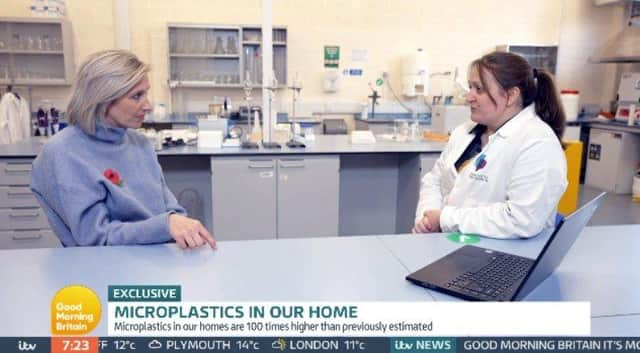World-first investigation by University of Portsmouth and Good Morning Britain finds people are breathing in 100 times more microplastics in homes than thought


As COP26 continues this week, Good Morning Britain (GMB) and the University of Portsmouth have embarked on a groundbreaking investigation into microplastics.
For the very first time, the exclusive research looks at exactly what is in the air in people’s homes and the impact on health.
Advertisement
Hide AdAdvertisement
Hide AdAccording to professor Anoop Jivan Chauhan MBE, respiratory specialist and director of research and innovation at Portsmouth Hospitals University NHS Trust, the results are 100 times higher than any other academic research has previously predicted.
GMB reporter Michelle Morrison invited Dr Fay Couceiro, reader in environmental pollution at the u, into her home for a day in October alongside her eight-year-old daughter and five-year-old son.
New technology allowed Fay to measure the very small, breathable microplastics from the indoor air for the first time. Samples were taken from three rooms - the kitchen, Michelle’s bedroom and her childrens’ bedrooms.
During the testing phase, Michelle was cooking in the kitchen and in her bedroom she was sorting her clothes into plastic and non-plastic piles, which revealed three-quarters of her wardrobe contained plastics such as polyester and nylon. In the childrens’ bedrooms they were play-fighting with soft toys.
Advertisement
Hide AdAdvertisement
Hide AdThe highest amount of microplastics were found in Michelle's daughter's bedroom due to the carpets, non-cotton bed linen and soft toys.
Results showed the family are likely each breathing in between 2,000 - 7,000 microplastics per day - the equivalent of two giraffes standing on top of each other (12.69 metres) over a year and taller than the Eiffel Tower (363 metres) over a lifetime.
Michelle Morrison, Reporter, Good Morning Britain, said: ‘Like most families in the UK, I like to think we are doing our bit at home to reduce the use of plastics in our everyday lives so I was intrigued to take part in this world-first experiment.
‘I never dreamed the result would be that my young children and I are breathing in up to 7,000 microplastics each day. I really hope this research can help shine a light on such an important topic for us all.’
Advertisement
Hide AdAdvertisement
Hide AdDr Fay Couceiro, reader in environmental pollution at the university, said: ‘I have been looking for a partner to conduct this experiment with for some time now and I am thrilled that Good Morning Britain has worked so closely with us on this vital project.
‘Considering the numbers we’ve found and the numbers we are breathing in – wouldn’t you like to know more about what microplastics are doing to us? I know I would.’
Professor Anoop Jivan Chauhan MBE said: ‘This unique study shows very high levels of microplastics in our homes and the data uncovered is really quite shocking.
‘Potentially we each inhale or swallow up to 1.8m microplastics every year and once in the body, it’s hard to imagine they’re not doing irreversible damage. There can be no health benefits of inhaling microplastics; they’re dangerous and we need more research like this to fully understand how they can harm our bodies.
Advertisement
Hide AdAdvertisement
Hide Ad‘To date, the bulk of research has centred around pollutants outside of the home such as car emissions but as this initiative proves, it’s essential we widen our focus on the dangers in our homes.’
The University of Portsmouth is committed to tackling global plastics problems through its Revolution Plastics project.
SEE ALSO: University gets funding boost
Professor Steve Fletcher, director of the project, said: ‘The results that have come from our laboratories highlight the worrying issue of the all pervasive plastic pollution that is everywhere around us. Here at the University of Portsmouth we are continuing to search for solutions to a growing threat that for many is only just becoming apparent.
‘Be it microplastics in the air or large amounts of plastic waste in our oceans, there needs to be a better understanding of the impact and ways of dealing with it.’
Advertisement
Hide AdAdvertisement
Hide AdAlberto Costa MP, chair of the All-Party Parliamentary Group on Microplastics said: ‘I am shocked to read of the University of Portsmouth’s findings that large quantities of airborne microplastics are present in our homes.
‘Important research such as this must be carried out so we can better understand the potential harms microplastics can have not only to the environment but to human health.
‘We have been looking at the effects microfibre plastics can have, which are shed from textiles during laundry, on our rivers and seas. I am urging the government to consider bringing forward legislation to ensure all new washing machines are fitted with microfibre catching filters and will be raising this in the House of Commons.’
A message from the Editor, Mark Waldron
You can subscribe here for unlimited access to our online coverage, including Pompey, for 26p a day.
Comment Guidelines
National World encourages reader discussion on our stories. User feedback, insights and back-and-forth exchanges add a rich layer of context to reporting. Please review our Community Guidelines before commenting.
